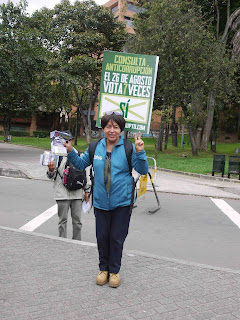 |
| Campaigning against corruption. |
Most of the initiatives, which would increase transparency about government officials' finances, are positive.
But one of the referendum's measures would cut goverenment officials' salaries. That sounds satisfying to those of us who dislike politicians.
But stop and think for a minute: Is a politician who is well-paid or one who is poorly-paid more vulnerable to being corrupted? The poorly paid politician needs money badly and figures he has less to lose by letting a businessman grease his palm in exchange for a contract.
And policemen, who get paid miserably, are some of the most notoriously corrupt officials in Colombia.
Two tourists told me recently how they stepped out of their hotel in La Candelaria one evening smoking a joint, only to have cops pull up and threaten them with arrest. The brave defenders of the law finally let the tourists off for a payment of about 400,000 pesos. That's a huge chunk of a beat cop's monthly income. Many cops, I'm sure, make more money shaking tourists down than they do from their salaries.
Slashing politicians' salaries sounds more like anti-politician resentment than any rational anti-corruption policy.
For better or worse, the anti-corruption referendum is unlikely to reach the minimum participation level to have legal affect.
Needless to say, if Colombia really wants to reduce corruption it should remove one of corruption's biggest drivers: Prohibitionist drug laws.
By Mike Ceaser, of Bogotá Bike Tours




No comments:
Post a Comment